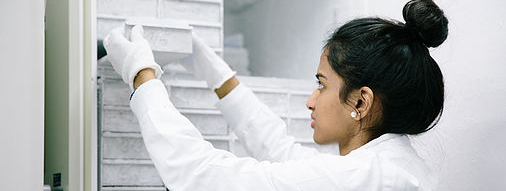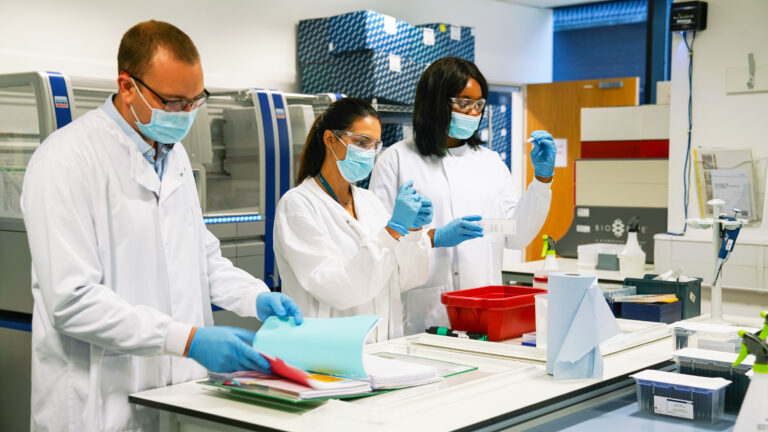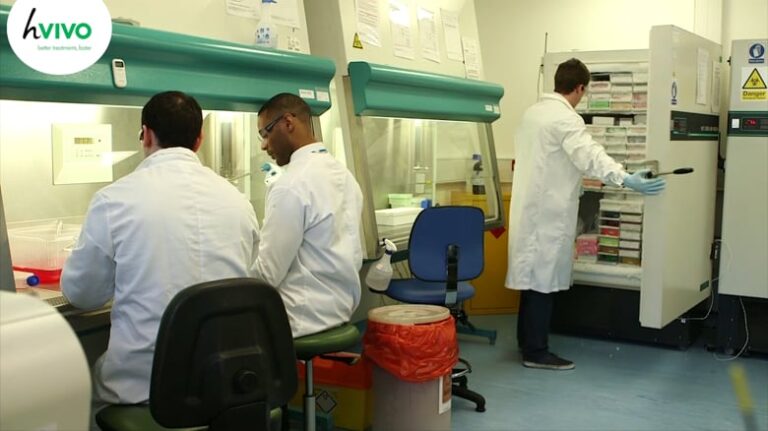Open Orphan plc (LON:ORPH), a rapidly growing specialist contract research organisation (CRO) and world leader in testing infectious and respiratory disease products using human challenge clinical trials, announced today the results from the world’s first COVID-19 characterisation study, which was a partnership between hVIVO, Imperial College London, the Vaccine Taskforce and Department of Health and Social Care (DHSC), and the Royal Free London NHS Foundation Trust. The results from this landmark study, show that a SARS-CoV-2 human challenge is safe in healthy young adults and provide detailed insights into the course of COVID-19 infection with potential positive public health implications.
As part of the characterisation study, researchers aimed to identify a dose of COVID-19 that caused a safe and reliable infection in unvaccinated volunteers with no prior SARS-CoV-2 infection. The results published today detail the outcome of the 36 healthy male and female volunteers aged 18-29 years which were infected with the original SARS-CoV-2 strain challenge virus. hVIVO clinicians closely monitored volunteers in a controlled quarantined setting and collected disease progression data to provide insights into COVID-19 infection. Volunteers will be followed up for 12 months after discharge from the quarantine facility.
The key clinical insights were as follows:
Viral load (“VL”)
· 18 volunteers (50%) became infected with viral load (VL) rising steeply and peaking at ~five days post-inoculation
· No quantitative correlation was noted between VL and symptoms
Symptoms
· No serious symptoms
· Mild-to-moderate cold like symptoms were reported by 16 (88%) of 18 infected volunteers including a stuffy or runny nose, sneezing, and a sore throat. Some experienced headaches, muscle/joint aches, tiredness and fever
· Anosmia (lost or changed sense of smell) occurred in 13 (72% of infected) volunteers
Virus detection
· Average time from first exposure to viral detection and early symptoms (incubation period) was 42 hours
· Virus was detected earliest in the throat but at significantly greater levels in the nose;
o Virus detected in the throat on average after 40 hours
o Virus detected in the nose on average after 58 hours
· High levels of viable (infectious) virus was seen for approximately nine days post-inoculation, and up to a maximum of 12 days
· Modelling using the study data indicated that regular asymptomatic lateral flow testing (“LFT”) would diagnose infection before 70-80% of infectious virus had been generated, thus if isolation was triggered would decrease community transmission to others
Importantly, no serious adverse events (SAEs) occurred, and the SARS-CoV-2 human challenge study model was shown to be safe and well tolerated in healthy young adults. With the characterisation study disease modelling data completed, and a COVID-19 Human Challenge Model now established, the Company should be able to contract / conduct COVID-19 human challenge studies in 2022, subject to individual ethics and regulatory approvals. The Company is already developing a Delta strain of the COVID-19 virus in partnership with Imperial College London and funded by the Wellcome Trust, which could be used in future trials.
The data published today supports the safety of the infection challenge model which could theoretically provide a ‘plug and play’ platform for testing therapies and vaccines using the original COVID-19 strain as well as variants of the virus.
The characterisation study results and the insights they provide into COVID-19 infection have potential implications for public health. During the study, the average incubation period was 42 hours, which is considerably shorter than existing estimates of five to six days. Results also showed that while virus was detected significantly earlier in the throat, peak levels of virus were far higher in the nose, implying a potentially higher risk of viral shedding from the nose. This underlines the importance of proper facemask use to cover both the mouth and nose. Additionally, insights into the timeline of infection, with viable virus seen after nine days and 12 days for some, support the isolation periods advocated in most guidelines.
Lateral flow tests (LFTs) were also shown to be a good indicator of whether someone was harbouring viable virus. Positive LFTs correlated well with lab-confirmed detection of virus from swabs throughout the course of infection, including in those who were asymptomatic. However, the tests were less effective in picking up lower levels of virus at the very start and end of infection.
The challenge virus used in the study was produced under hVIVO’s supervision by a team at Great Ormond Street Hospital for Children NHS Foundation Trust in London, with support from virologists at Imperial College London. The Human Challenge Programme is funded by the UK Government, who commissioned Imperial College London to act as the clinical study sponsor. The study was conducted by hVIVO at the Royal Free Hospital, under the supervision of the Company’s highly trained scientists and medics.
Cathal Friel, Executive Chairman of Open Orphan, said: “I am delighted that the world’s first COVID-19 characterisation study has completed with no serious adverse events or serious symptoms, demonstrating that a COVID-19 human challenge study is safe in healthy young adults. The results, which have been made public today, have provided invaluable insights into COVID-19 disease progression.
“Crucially, we have now successfully established a COVID-19 Human Challenge Model which could be instrumental in accelerating the development of future COVID-19 therapeutics. New variants, such as Omicron, often mean that vaccines and antivirals have to be quickly re-evaluated to ensure effectiveness. Human challenge studies could prove to be the fastest way to compare old and new vaccines and therapies.”
Dr Andrew Catchpole, Co-investigator on the study and Chief Scientific Officer of hVIVO, said: “The SARS-CoV-2 characterisation study has provided invaluable insights into the progression of COVID-19 infection in healthy young adults. Importantly the study demonstrated that SARS-CoV-2 challenge studies are safe and well tolerated by the volunteers with no serious symptoms and no Serious Adverse Events (SAEs). The study’s results have provided useful insights which could be used to inform public health decisions on COVID-19 symptoms and virus detection going forward, including isolation periods for infectious individuals, the use of LFTs, and establishing the human challenge platform to investigate further aspects of COVID-19.
“While the characterisation study was focused on the original SARS-CoV-2 strain, and there are differences in transmissibility between it and the other variants, the same factors will be responsible for protection against it, meaning the findings remain valuable for variants such as Delta or Omicron. These data provide a clear platform to now utilise the human challenge model to expedite product efficacy testing for new vaccines or antivirals”
Professor Christopher Chiu, Professor of Infectious Diseases from the Institute of Infection at Imperial College London and Chief Investigator on the trial, said: “First and foremost, we’ve shown that our challenge infection model was safe and well tolerated in healthy young adult participants. People in this age group are believed to be major drivers of the pandemic and these studies, which are representative of mild infection, allow detailed investigation of the factors responsible for infection and pandemic spread.
“Our study reveals some very interesting clinical insights, particularly around the short incubation period of the virus, extremely high viral shedding from the nose, as well as the utility of lateral flow tests, with potential implications for public health.”
Professor Sir Jonathan Van-Tam, Deputy Chief Medical Officer at Department of Health and Social Care, said: “Human challenge studies have been performed using other pathogens for decades, including flu and Respiratory Syncytial Virus (RSV). They need full independent ethical review and very careful planning – as has been the case this time. Every precaution is taken to minimise risk.
“Scientifically these studies offer real advantage because the timing of exposure to the virus is always known exactly, therefore things like the interval between exposure and the profile of virus shedding can be accurately described.
“This important study has provided further key data on COVID-19 and how it spreads, which is invaluable in learning more about this novel virus, so we can fine-tune our response. Challenge studies could still prove to be important in the future to speed the development of ‘next-generation’ Covid-19 vaccines and antiviral drugs.
“This data underline just how useful a tool lateral flow tests can be to pick up people when infectious and the importance of wearing a face covering in crowded, enclosed spaces.”
Dr Mariya Kalinova, Principal Investigator on the study and Medical Director of hVIVO, said: “Closely observing and examining COVID-19 infection disease progression in volunteers during the SARS-CoV-2 characterisation study has revealed several important insights which will benefit public health going forward. Results uncovered new insights into the average incubation period for COVID-19 infection as well as disparities in viral loads between the nose and mouth, which endorses proper mask wearing guidance. Most importantly, there were no serious or adverse events, which proves a SARS-CoV-2 challenge is safe and well tolerated.”
Dr Sir Michael Jacobs, consultant in infectious diseases at the Royal Free London, said: “We have vast experience of safely managing highly transmissible infections at the Royal Free Hospital and we are really pleased to have been able to play our part in this landmark study.
“The trial has already provided some fascinating new insights into SARS-CoV2 infection, but perhaps its greatest contribution is to open up a new way to study the infection and the immune responses to it in great detail and help test new vaccines and treatments.”
‘Safety, tolerability and viral kinetics during SARS-CoV-2 human challenge’ by Killingley, B. et al. is available on the Research Square pre-print server and has been submitted for peer-review. DOI: 10.21203/rs.3.rs-1121993/v1 https://www.researchsquare.com/article/rs-1121993/v1








































